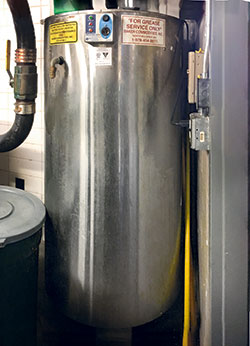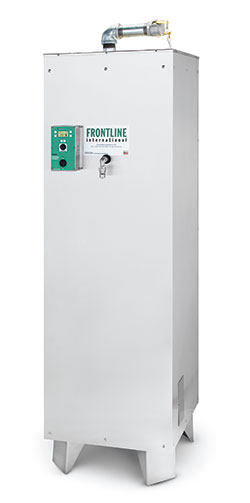The stats are impressive: 27 dining locations, 25,000 meals a day, 5 million meals each year. Also impressive? Many of those locations are served by more than a dozen Frontline International Direct-Plumbed® waste oil tanks—some in their 15th year of service.
 Radcliffe Quad undergrad housing at Harvard University in Fall in Cambridge, MA, USA
Radcliffe Quad undergrad housing at Harvard University in Fall in Cambridge, MA, USA
This staggering number of meals and visionary adoption of Frontline’s fryer oil management equipment—a category in its infancy 15 years ago—spring from the leadership position in non-commercial foodservice held by Harvard University Dining Services (HUDS), the oldest collegiate foodservice establishment in the country. HUDS’ director of operations and facilities, Robert Leandro, has made Frontline International a key component of his planning.
“As a matter of course, I make sure any new fryer we buy is modified to accept the Direct-Plumbed system,” said Leandro. “I know it will be one less thing I have to worry about. Frontline equipment performs for me year after year, with minimal maintenance.”
 Harvard received its first Frontline International waste oil tank, pictured here, in 2004. The tank is still in operation today. Frontline, an industry pioneer, was founded in 2000, making Harvard among the industries’ earliest adopters of the technology.In fact, an annual maintenance visit to clean oil-level floaters in each tank is all Leandro has needed to get up to a decade and a half—and counting—of service from his tanks.
Harvard received its first Frontline International waste oil tank, pictured here, in 2004. The tank is still in operation today. Frontline, an industry pioneer, was founded in 2000, making Harvard among the industries’ earliest adopters of the technology.In fact, an annual maintenance visit to clean oil-level floaters in each tank is all Leandro has needed to get up to a decade and a half—and counting—of service from his tanks.
HUDS operates 13 residential dining halls, one kosher facility, 15 retail establishments, and a catering operation on Harvard’s campus. In all, 15 HUDS locations are linked up to Frontline waste oil collection tanks. The freshman dining hall, for example, has 10 fryers plumbed to a single tank.
“In the days before Frontline, we had to wheel buckets of spent grease to our loading dock and pour it into a 55-gallon drum,” said Leandro. “It was messy, dirty work. Now, at any location that has a Frontline system, the oil goes to the tank, a renderer picks it up, and I don’t even have to think about it.”
 Modern Frontline equipment are “smart” tanks, beaming oil volume, usage, filtration, and other data sets to customers, renders, and more. Beyond convenience, the environmental benefits are crucial, said Leandro. “Our campus is right on the Charles River. All it would take is one leaking drum or dumpster to drain into a storm sewer, and HUDS could face significant fines. It’s something we have to take seriously, especially because we have such a strong commitment to sustainability.”
Modern Frontline equipment are “smart” tanks, beaming oil volume, usage, filtration, and other data sets to customers, renders, and more. Beyond convenience, the environmental benefits are crucial, said Leandro. “Our campus is right on the Charles River. All it would take is one leaking drum or dumpster to drain into a storm sewer, and HUDS could face significant fines. It’s something we have to take seriously, especially because we have such a strong commitment to sustainability.”
Leandro says of Frontline, “For me, it’s a no-brainer. You can’t beat the benefits and the return-on-investment.”
“I occasionally wonder when I’m going to get the call that something is wrong with one of the tanks or lines. I haven’t had any issues at all,” said Leandro. “I hope I’m not jinxing myself!”



